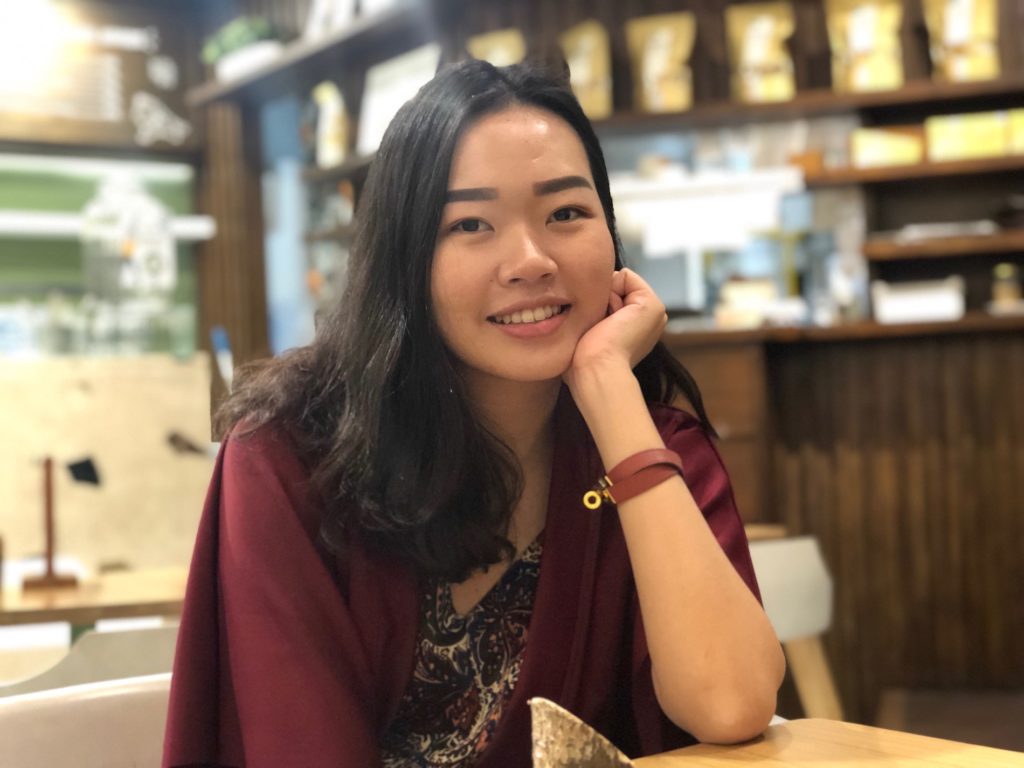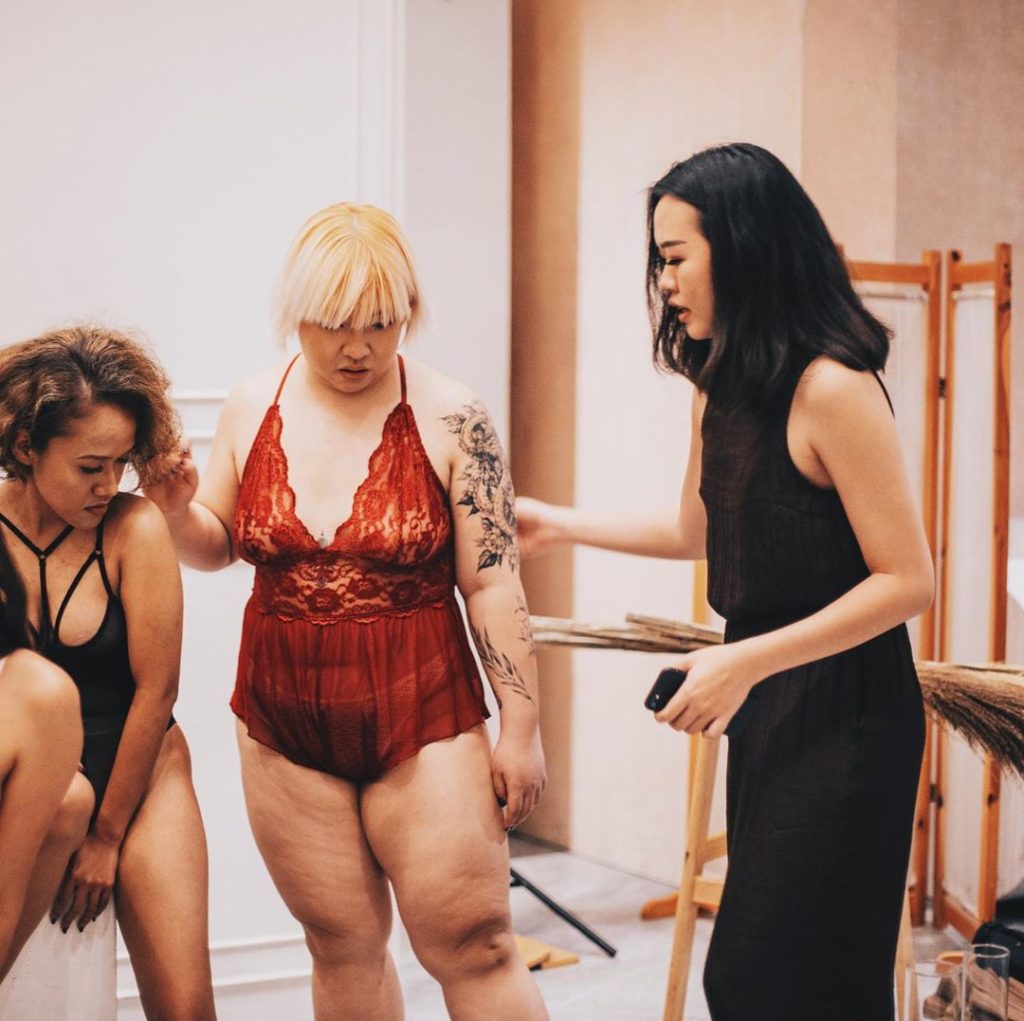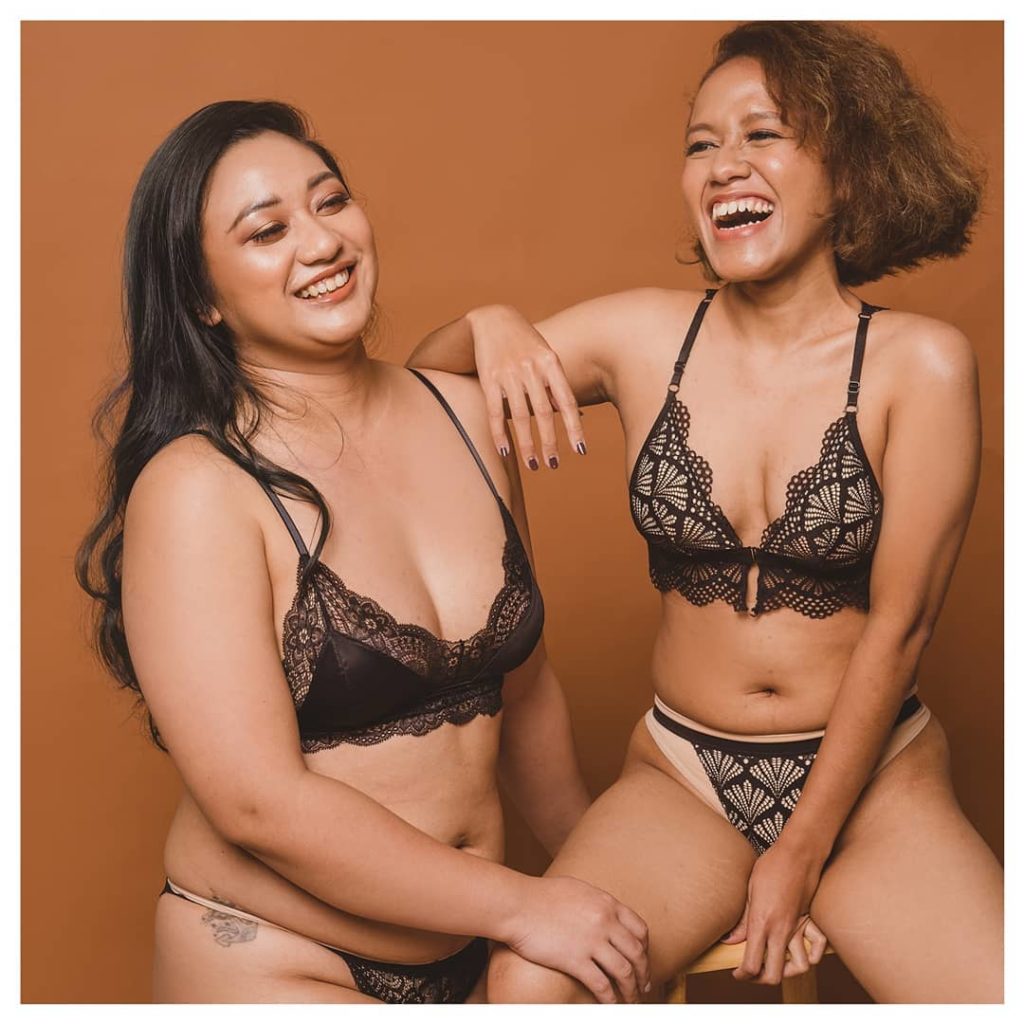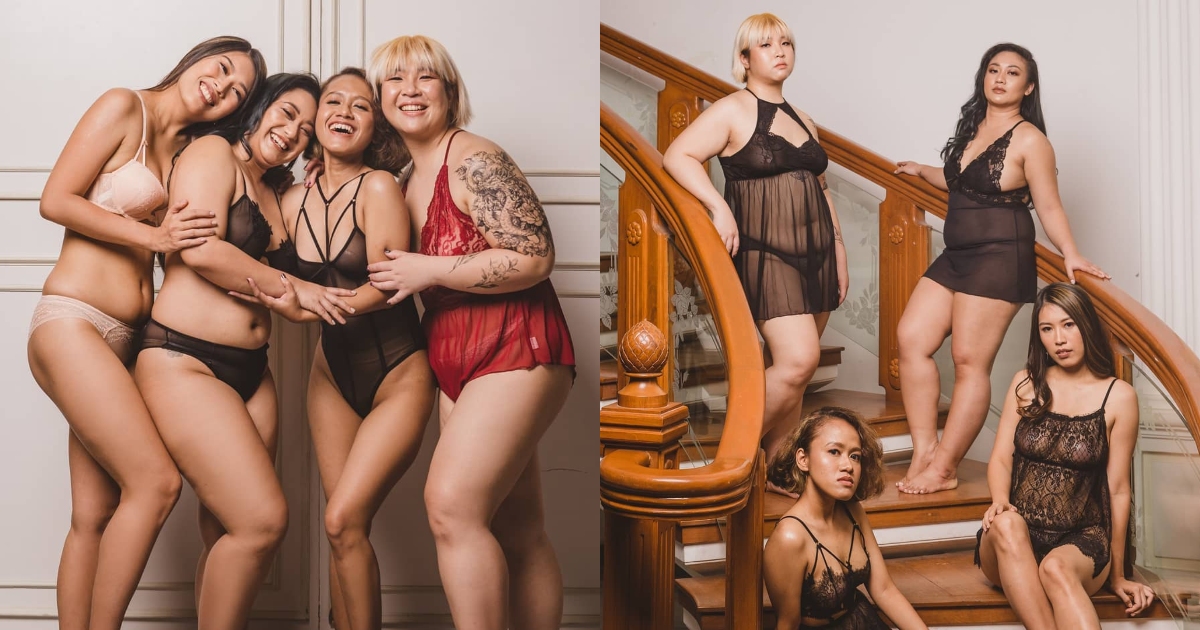In my 26 years, I never expected to get so emotional over a promotional campaign from a lingerie brand.
It happened one evening when I was scouring Instagram after work, looking for new local fashion brands to discover. I stumbled upon Nipplets, an Indonesian lingerie brand that offers a variety of underwear, sleepwear, robes and certain accessories for if you’re into the kinky stuff (no judgments here).
Shopping for lingerie was not something I bothered with before, because I’ve been conditioned to believe that only those with so-called “ideal” bodies are able to feel sexy wearing it. Mind you, I think people should be free to wear what they like regardless of their body shape, but at the same time I wear loose t-shirts and knee-length pants to sleep because I’ve always been comfortable in that kind of clothing.
Yet Nipplets’ Instagram feed was a sight to behold. Here I saw four female models with different body shapes and sizes, all wearing beautiful lingerie and underwear sets to showcase the brand’s products. In general, seeing real women — in the sense that they aren’t professional models or influencers — modeling for local fashion brands is still quite rare, let alone for a lingerie brand.
I still remember looking at two of the models with bodies that look similar to my chubby self in awe, simply because I’ve never seen that kind of representation in Indonesia before. The message to me was clear — we are not to be ridiculed because of our size, and everyone can be as sexy as they want to be, dammit.
So I managed to track down and have a chat with Ida Swasti, the 25-year-old founder of Nipplets, to talk about her brand and its body-positivity lingerie collection and campaign, dubbed Real People Real Body, which was launched in July. The second series of the Real People Real Body collection, which is slated to be released in October, will offer lingerie in sizes from XS to 5XL.
Are Indonesian women ready to see flabby tummies, acne scars, and stretch marks in advertisements for lingerie and embrace their own physical flaws?
The interviews below have been edited for clarity.

What is it about lingerie that you love so much that you launched your own brand?
It began when I lived abroad for my studies — I went to the University of Wollongong in Australia. At that time, I still wore “grandma panties”, the ones that are big and made of cotton. One day, my friend told me, “as a woman, you should wear nice underwear. You should feel sexy inside even when no one can see it, because it will boost your confidence.” Another friend bought me a g-string, and at first I didn’t feel comfortable wearing it. But I felt a difference; I felt really sexy and confident. Since then, I came to love lingerie.
What do you think of the lingerie industry in general, in Indonesia and abroad?
In the last three years, the sales of the likes of Victoria’s Secret have seen a sharp decline in Indonesia because they stick to their “Angels”, insisting that ideal women are the ones who look like them. But all of them are size 0 so no one in this world is as perfect as them. But there’s another brand, called Aerie, which shocked the world with their inclusive campaign. I initially wanted to model Nipplets after Victoria’s Secret, but I changed our orientation to embrace all kinds of bodies.
What makes you different from other Indonesian lingerie or underwear brands?
We have unique items such as crotchless panties or cupless bras — kinkier items which are quite rare in conventional underwear stores here.
In terms of marketing, we make our customers feel as if they’re shopping for underwear with their friends and asking for advice from them. They can also tell us about insecurities they have about their bodies, so we can suggest suitable items according to their needs.
If I wanted to think only about profit, then the fact that the body positivity campaign was costly would have prevented me from doing it. Many of my fellow online shop owners told me, “You’re crazy, there’s so much risk in spending a lot of money for a campaign like this”. But for me, I’m happy doing it.
We also provide sex education through our social media channels. We conduct CurHot (short for “curhatan hot”, meaning “hot heart-to-heart” in Indonesian) everyday, where our customers can share stories about changes they experienced after wearing our lingerie. Other than that, we also have open discussions, where we raise topics that are considered weird or taboo such as anal sex or BDSM, and we recently talked about milder topics such as “baby blues” and sex after marriage. We do this because, in this country talking about sex is taboo, while doing it is not.
“If anyone has perverted thoughts because of what others wear, the pervert is to blame.”
Can you describe your clientele?
The majority of our customers are between the ages of 24-34, but we also have had customers under 24 and above 34 to 50. They’re mainly from major cities like Jakarta, Bandung, Surabaya, Semarang, but we have also received orders from Sumba and Papua.
Why did you launch the body positive campaign?
Our followers’ advice. We changed our tagline from “Sexy, not slutty” to “All bodies are beautiful” thanks to advice from one of our followers. She sent us an email explaining why she didn’t agree with our previous tagline and I really appreciate it when our followers criticize me in a positive way because I can learn from them.
Also, we used to hire mainly white models with proportional bodies for our older campaigns. Then, several customers told us, “Sis, maybe try hiring Asian models, or people with not-so-perfect bodies, because we can’t relate to your brand”. We gradually received more and more similar messages, that’s when I realized that our target market is ready for a body positivity campaign.
Many of my followers are insecure about their bodies. Some told me that they disliked their big arms, while others said they hated their flabby tummies. I always tell them that their insecurities were caused by the media, which has instilled the idea that being skinny equals ideal body.
You held an open casting for models for your body-positivity campaign. What factors were you looking for?
I don’t judge by their looks or bodies; I looked for people who are interesting. They told me why they were interested in taking part in the campaign — one of my models said she used to be bullied and she wanted to join the campaign as her way to speak up. For our second edition of Real People Real Body, we hired moms to be our models because they reflect many of our followers. They’re mainly insecure because their bodies changed drastically after giving birth, such as having bigger thighs or getting stretch marks.
What has been the general reaction to the body positivity campaign? Were they mostly positive? Any body shaming?
I can say that around 98% of the responses we received were highly positive. Most of them said the campaign helped them to boost their confidence. “Whoa, there’s a woman in my size wearing a lingerie set, it means I can wear it too!” they said. Many of our followers ended up buying our products after seeing the campaign despite having followed our Instagram for quite a long time.
But there were some negative reactions too, such as people who asked, “Does it mean you support the obesity movement?”. I don’t reply to such questions, but in my mind, plus-size people aren’t always unhealthy. My plus-size models are healthier than me, as they work out more often than I do. Three of the mom models are gym freaks, and one of them is even a bodybuilder. You can’t judge people by their body sizes. Through the Real People Real Body campaign, I also aim to fight body shaming. Yes, you can give advice to your friends to get in better shape or lead a healthier lifestyle, but you can’t shame them.

How has the campaign affected the business?
My sense of fulfillment as an entrepreneur doesn’t only come from money, because I want to have a positive impact on others. I see the campaign as an investment for my brand — yes, the sales have increased, but the cost of production has increased as well, so the profit I gained was pretty much the same as before.
Do you think other lingerie purveyors should follow your lead in making a campaign like this?
To each their own. Actually, if there are other lingerie brands doing similar campaigns, I’d be really glad because it means I inspired people. Anyone can do it, and as long as they have a positive impact on other people, it’s a good thing.
You appear in numerous photos and videos associated with Nipplets. Were you ever worried about having your identity associated with what some Indonesians may consider taboo?
Once, a member of my extended family followed Nipplets, then the person told on me to my mom. I got lectured by my mom, but I told her, “If I, a real person, don’t wear my own products, how could I convince customers that my lingerie is for everyone?”
Some people told me that lingerie is for married women only. I’m not married yet, but I wear lingerie because it’s my way of showing self-love.
I have gotten perverted messages too, but I stressed to them that I’m here to show that anyone can wear my products. Nipplets’ Instagram account is not a place for perverted men.
What is your general view on sexual liberation in Indonesia? Has it gotten better or worse in recent years?
I personally see that sexual liberation is intrinsically tied to sex education. I’m aware that most Indonesians don’t receive proper sex education during their school years, myself being among them. How did most of us, including myself, get ours? By watching porn, and I think it’s wrong because they instill such unrealistic standards.
Many in our country, including the government, think that they shouldn’t provide sex education so that youngsters will abstain from sex. The thing is, they can never hold people back from having sex. What they can do is give proper sex education, so when people — especially young people — are doing it, they can avoid getting pregnant out of wedlock or sexually transmitted diseases.
I personally feel more Indonesians are becoming open to talk about sex, but it’s usually among members of the same gender such as the “educational” discussions about sex between me and my girlfriends.
Additionally, people should be free to wear anything they like. If anyone has perverted thoughts because of what others wear, the pervert is to blame. I think sexual liberation has gotten worse due to our increasingly conservative society, and stuff related to sex being considered taboo here.
The empowered models

I also got to talk to Dinar Bakti and Naomi Uli, two of the four models in the first edition of Real People Real Body. Here, they recounted their personal stories as well as what motivated them to model lingerie for Nipplets.
Did you feel changes within yourself after modeling for Nipplets?
Dinar: I felt like I was ready to embrace everything about my body. My biggest insecurities were my hair and acne scars on my back. But after taking part in this campaign and seeing the positive feedback, the energy from it transformed me to be more confident.
Naomi: I feel like I really stand by the phrase “your body is a temple” now and I appreciate myself and my body more. I’m taking better care of myself now, to the point that I’m seeking professional help for my mental health.
Why were you interested in participating in the campaign?
Dinar: The chance to speak up about body-positivity, and I’m glad the message was delivered well.
Naomi: I was in quite a battle with my body. I just had a non-cancerous tumor taken out from my breast and I was left with a post-surgery scar. I felt damaged. On top of that, I was unable to do any physical training for pre-op and post-op recovery so I put on quite a lot of weight. I was at a point where I was wondering if I ever dated again, would the guy be able to accept my body with all its scars?
How did you feel during the photoshoot?
Dinar: I was nervous, because it was the first time for me to be a model in a photoshoot. Prior to the photoshoot, we were briefed and given a mood board, which helped me a lot. The Nipplets team was really helpful, they made us comfortable and the models bonded easily too, so it felt like a girl’s day out.
Naomi: Surprisingly very relaxed! It helped that we’ve all met up before the shoot to get to know each other. A few days after the shoot, I realized that I was walking around the studio not caring about my scar and my belly pooch.
Did you experience any social repercussions from people who know you or from strangers, in real life or online?
Dinar: I got mostly positive responses from my friends, co-workers, even strangers, but my family initially reacted otherwise. I understood that they were just worried about me, but they finally gave their support after I explained what the campaign’s all about. They also gained a new insight because I constantly sent them articles that covered the campaign or other stories related to the issue. This is good, not just some girls doing a photoshoot in lingerie.
Naomi: The majority of the reactions I’ve seen so far are positive. One of my friends even joined the second season of Real People Real Body while others spent their money on Nipplets’ lingerie. I personally don’t quite care what strangers say, but we saw a negative comment on Twitter that accused us of “justifying women leading unhealthy lifestyles.” I felt personally attacked, because that’s not what the campaign is about and all four of us have different shit to deal with, mentally and physically. Just because we look the way we do doesn’t mean we don’t take care of our health.
Lastly, what is body positivity to you?
Dinar: Body positivity is when you and me feel comfortable with anything about our bodies, because the only one who knows its growth and changes from the beginning is ourselves.
Naomi: Body positivity isn’t just about being comfortable with how you look. It’s also about taking better care of yourself by working out, eating better. I would even go as far as using enhancements like botox and the like. It also has to do with mental health. Because, in my case, whatever is happening beyond the surface will manifest itself physically sooner or later — which is why I owe it to myself to get help. It goes hand in hand, you really can’t feel positive if your mental state is shit.


